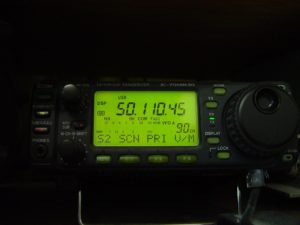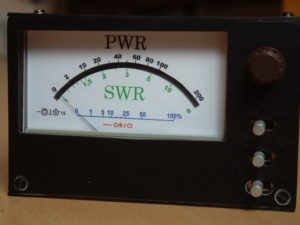Slovenský zväz rádioamatérov spolupracuje od jari minulého roku s Telekomunikačným úradom na zmenách povoľovacích podmienok a súvisiacich predpisov. Amatérsku verejnosť o tom informovala Ing. Kováčová na stretnutí TATRY 2006. Na ostatnom rokovaní, ktoré prebehlo v utorok 16.1.2007 v priestoroch SZR, za účasti Ing. Kováčovej z TÚ SR a všetkých troch štatutárov SZR (OM3EI, OM3LU, OM3JW), bol zo strany SZR predložený konkrétny návrh.
Návrh sa týka nasledovných bodov:

Zmena tried operátorov z doterajších štyroch (A, B, C, D) na dve (A a N). V triede A (CEPT) sú povolené všetky pásma a max. výkon 750 W. V triede N sú povolené časti pásiem 1.8, 3.5, 10, 21, 28 MHz plus všetky VKV pásma a max. výkon 100 W.
Zmena tried zodpovedá trendu, akým sa uberá vývoj v Európe a ostatných rádioamatérsky vyspelých krajinách sveta. Trieda A bude plnohodnotná trieda s povolenými všetkými pásmami, módmi a najvyšším výkonom. Trieda N je určená pre nováčikov a jej účelom je príprava na triedu A. V triede N bude možné pracovať v obmedzených úsekoch KV pásiem, v celom rozsahu VKV pásiem, s obmedzeným výkonom 100 W. Podobné povolenie majú napr. v Nemecku.

Transformácia doterajších operátorských tried: Držitelia povolení A, B a C prejdú do triedy A. Držitelia povolení triedy D prejdú do tzv. prechodnej triedy N1, kde budú povolené len VKV pásma a max. výkon 100 W.
Pre držiteľov povolení triedy A sa nezmení nič. Držitelia povolení triedy B získajú možnosť pracovať s plným výkonom 750 W. Najviac na zmene získajú držitelia triedy C, ktorí budú môcť pracovať na všetkých KV pásmach s plným výkonom 750 W. Držitelia triedy D nemôžu prejsť automaticky do triedy N, pretože nerobili skúšku z prevádzky na KV. Aby mohli vysielať aj naďalej v rámci svojej súčasnej triedy, bola pre nich vytvorená trieda N1. Ak budú chcieť získať triedu N, musia zložiť skúšku na triedu N. Pri návrhu kritérií pre transformáciu tried sme sa snažili o to, aby žiadna trieda nebola poškodená voči súčasnému stavu. Triedy B a C získajú vyšší výkon a viac pásiem, triedy A a D nezískajú nič, ale ani nič nestratia.
Zrušenie požiadavky na znalosť telegrafie pre vydanie rádioamatérskeho povolenia triedy A a N. Podmienkou pre získanie triedy A bude 1 rok prevádzky v triede N a nadviazanie minimálne 500 spojení (okrem miestnych FM spojení a spojení cez prevádzače).
Zmena zodpovedá trendu, akým sa uberá vývoj v Európe a ostatných rádioamatérsky vyspelých krajinách sveta. Tí, čo budú chcieť zložiť skúšku z telegrafie, môžu o to Telekomunikačný úrad požiadať, ten bude povinný ich vyskúšať a vydať osvedčenie.
Pridanie pásma 122 GHz do frekvenčnej tabuľky.
Frekvenčný rozsah 122,25 – 130 GHz je ako sekundárny vyhradený pre rádioamatérsku službu. SZR preto žiada o jeho dopísanie frekvenčnej tabuľky.

Vykonávanie rádioamatérskych skúšok: Skúška sa bude skladať z dvoch častí – písomnej (test) a ústnej. Predpokladom pripustenia na ústnu skúšku bude získanie určeného počtu bodov v písomnej časti.
SZR žiada, aby boli skúšky vykonávané transparentne formou testov s bodovanými odpoveďami. Aby sa uchádzači mohli na skúšky pripraviť, budú otázky aj so správnymi odpoveďami zverejnené portáli SZR na internete.
Zníženie vekovej hranice pre vydanie rádioamatérskeho povolenia na 10 rokov.
SZR žiada, aby mohli rádioamatérske povolenie získať už deti od 10 rokov, ktoré zložia skúšky. SZR vychádza zo skúseností s kurzov pre mládež, kde aj deti podstatne mladšie ako 15 rokov zvládajú skúšobné otázky a len kvôli nízkemu veku nemôžu ísť na skúšky. Podmienkou pre vydanie povolenia by bol súhlas zákonného zástupcu.
Zo strany Telekomunikačného úradu bol návrh prijatý kladne. Úrad vo svojej kompetencii návrh zmien prerokuje a na medzirezortnej úrovni posunie do pripomienkového konania. Tento proces má svoje zákonom stanovené časové intervaly určené na vyjadrenia dotknutých orgánov, preto k zmenám dôjde až po určitom čase. Proces je však rozbehnutý a SZR bude aj naďalej spolupracovať s TÚ SR na jeho realizácii.
Organizovanie akýchkoľvek nátlakových akcií a petícií na zrušenie telegrafie, ako podmienky pre vydanie povolenia, je v tejto fáze úplne zbytočné a skôr kontraproduktívne. Na veci sa už dlhšie pracuje a je len otázkou času, kedy povoľovací úrad zmení Predpis o odbornej spôsobilosti a Všeobecné povoľovacie podmienky pre rádioamatérov.
P.S. Mimochodom, v Povoľovacích podmienkach nie je zmienka o nutnosti znalosti telegrafie, preto treba hlavne zmeniť Predpis o odbornej spôsobilosti, ktorý platí pre všetky služby, teda okrem amatérskej aj pre leteckú, lodnú atď. Poučenie: Keď chcem niečo zmeniť, tak si to najskôr prečítam.
Roman Kudláč, OM3EI
prezident SZR
Pozn.: uverejnené so súhlasom OK1RR podľa originálu http://www.c-a-v.com/content.php?article.586
